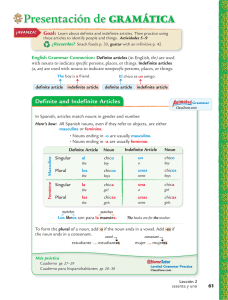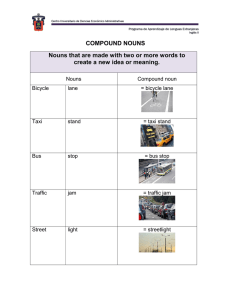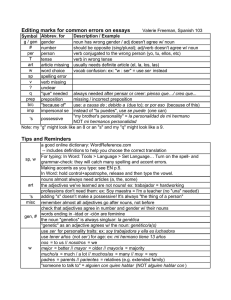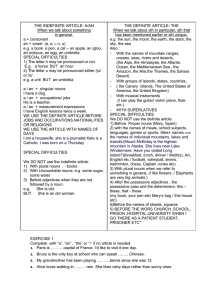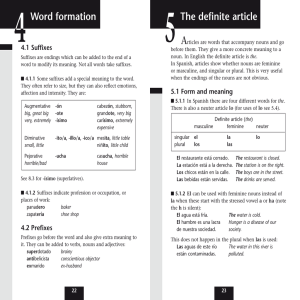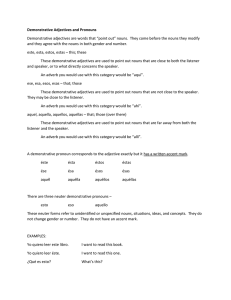NOMINAL PARTICIPLES, A CASE OF CATEGORIAL ALTERNANCE
Anuncio
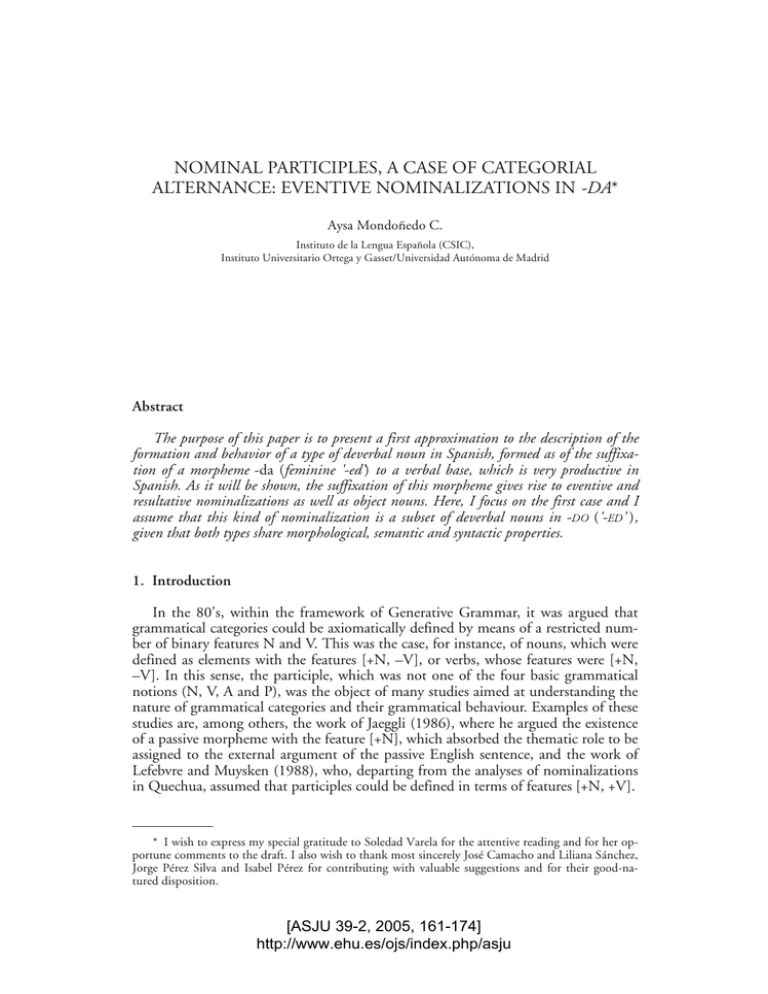
NOMINAL PARTICIPLES, A CASE OF CATEGORIAL
ALTERNANCE: EVENTIVE NOMINALIZATIONS IN -DA*
Aysa Mondoñedo C.
Instituto de la Lengua Española (CSIC),
Instituto Universitario Ortega y Gasset/Universidad Autónoma de Madrid
Abstract
The purpose of this paper is to present a first approximation to the description of the
formation and behavior of a type of deverbal noun in Spanish, formed as of the suffixation of a morpheme -da (feminine '-ed') to a verbal base, which is very productive in
Spanish. As it will be shown, the suffixation of this morpheme gives rise to eventive and
resultative nominalizations as well as object nouns. Here, I focus on the first case and I
assume that this kind of nominalization is a subset of deverbal nouns in -DO ('-ED' ),
given that both types share morphological, semantic and syntactic properties.
1. Introduction
In the 80's, within the framework of Generative Grammar, it was argued that
grammatical categories could be axiomatically defined by means of a restricted number of binary features N and V. This was the case, for instance, of nouns, which were
defined as elements with the features [+N, –V], or verbs, whose features were [+N,
–V]. In this sense, the participle, which was not one of the four basic grammatical
notions (N, V, A and P), was the object of many studies aimed at understanding the
nature of grammatical categories and their grammatical behaviour. Examples of these
studies are, among others, the work of Jaeggli (1986), where he argued the existence
of a passive morpheme with the feature [+N], which absorbed the thematic role to be
assigned to the external argument of the passive English sentence, and the work of
Lefebvre and Muysken (1988), who, departing from the analyses of nominalizations
in Quechua, assumed that participles could be defined in terms of features [+N, +V].
* I wish to express my special gratitude to Soledad Varela for the attentive reading and for her opportune comments to the draft. I also wish to thank most sincerely José Camacho and Liliana Sánchez,
Jorge Pérez Silva and Isabel Pérez for contributing with valuable suggestions and for their good-natured disposition.
[ASJU 39-2, 2005, 161-174]
http://www.ehu.es/ojs/index.php/asju
162
AYSA MONDOÑEDO
However, the past participle, generated from a verbal base to which a suffix is
added, namely -do ('-ed') or its allomorphs -to, -so and -cho, and the corresponding
feminine and plural forms (-DO) ('-ED'), may appear in several syntactic contexts
and presents, in Spanish, different forms and different associated properties. Among
these contexts we find the following in 1:
(1) (i)
(ii)
(iii)
(iv)
(v)
(vi)
(vii)
haber (aux. 'to have') + past participle
a. El partido de fútbol ha causado alboroto en la ciudad
'The football match has caused disturbance in the city'
ser (aux. ‘to be’)+ past participle
b. Los jinetes fueron vencidos por los toros salvajes
'The riders were beaten by the wild bulls'
estar (aux. 'to be') + past participle
c. El agua está contaminada
'The water is polluted'
Verbal participle in absolute clauses
d. Escritas las declaraciones, partió al aeropuerto
'Having written the statements, he left for the airport'
Verbal participle in agreed clauses
e. Asustados como estaban, se rindieron de inmediato
'Frightened as they were, they surrendered immediately'
Adjective participle1
f. Ese hombre es muy decidido
'That man is very resolute'
Nouns
g. El revelado cuesta 10 euros
'Developing costs 10 euros'
The purpose of this paper is to present a first approximation to the description
of the formation and behavior of a type of deverbal noun in Spanish formed as of
the suffixation of a morpheme -da (feminine '-ed') to a verbal base,2 which is very
1 Varela (2001) and (2002) establishes a difference between verbal and adjectival participles departing from a dual aspectual projection of the -do suffix (a progressive and a stative one) and states
that genuine -do adjectives are active and related to non-agentive verbs.
2 For this paper, I will assume that deverbal nouns in -da (and also in -DO) derive from verbs. I
believe that, for this especific case, the discussion about the base of the derivation of these nouns
does not lead to a solution that takes into account how the past participle, that can appear in any of
the constructions mentioned above in 1, can exhibit the different properties it shows in each case.
For example, for the case of nouns in -DO (-da included), it could be possible to assume that this
morpheme suffixes to a past participle, as has been sustained by Beniers (1977) and Bordelois
(1993), for instance, to a kind of root, or to a verb (as I assume). If it is assumed that the past participle that constitutes a noun is the base of the derivation, then it would be necessary to suffix
(some way) some kind of element that makes possible that this past participle, in a given case, behaves like a noun. If it is assumed that the base of the noun is a root, the suffix -da (or, in the general paradigm, the suffix -DO) should be, to some extent, responsible for the nominal behavior of the
elements we study, that is, nouns in -da (and -DO), or any other particle that produces this effect.
And if we assume that the verb is the base of these constructions, we also have to explain why, in
NOMINAL PARTICIPLES, A CASE OF CATEGORIAL ALTERNANCE: EVENTIVE...
163
productive in Spanish. As it will be shown, the suffixation of this morpheme gives
rise to eventive and resultative nominalizations as well as object nouns. Here, I will
focus on the first case and I will assume that this kind of nominalization is a subset
of deverbal nouns in -DO (1g), given that both types share morphological, semantic
and syntactic properties.3 The following examples seem to be ascribable to the general paradigm of deverbal nouns in -DO: Nouns referring to persons:
(2) a. El herido muestra señales de hipotensión
'The [V 'wound' -do] (wounded) shows signs of hypo-tension'
b. Tuvimos que acercarnos a ver a la muertita
'We had to approach to see the [V 'die' -t- (dim. suf.) -a] (little dead woman)'
c. Llegaron unos abogados trayendo la demanda contra la compañía
'Some [V 'advocate' -do -pl] (lawyers) arrived, with the demand against
the company'
Object nouns:
(3) a. A mí no me gusta el cocido
'I don't like [V 'stew' -do] (stew)'
b. El niño dejó toda la comida
'The child left the whole [V 'eat' -da] (meal)'
c. A todos engaña el parecido de Carlos con su hermano
'Carlos' [V 'resemble' -do] (resemblance) to his father misleads everybody'
d. Luis me regaló unas entradas para el cine
'Luis gave me some [V 'enter' -da -pl ] (tickets) for the cinema'
e. Subraye el predicado de la oración
'Underline the sentence's [V 'predicate' -do] (predicate)'
f. Yo preparo la picada y vos hacés la ensalada
'l prepare the [V 'niddle' -da] (snacks) and you make the salad'
this case, the case of nouns in -DO, the suffix or some other element allow these formations to act
like nouns.
[... ]
Root
... ]
V
-DO / -da ]
?]
p.p.
N
But any of these possibilities in itself allows us to explain how a formal past participle can act like a
noun here (1g). Moreover, how (1a) it can al so act like a compound verb, or with an auxiliary ser ('to
be'), that is, in a passive sentence (1b), with an auxiliary estar ('to be') (1c), in absolute or agreed
clauses (1d, e), or like an adjective (1f). In other words, it seems always necessary to consider the presence of an extra element to describe the different structures where the past participle participates or,
else, another process that can explain this multiple behavior of this element.
3 Although the cases of deverbal nouns in -DO have got the form of past participles, I assume them
to be nouns because of its syntactic and semantic behavior. I will leave aside the semantic arguments
that lead me to consider them nouns, but from the syntactic point of view, these elements present the
typical features of the nominal flexion (gender and number), appear inside DPs (specified by determinants and agreeing with them in gender and number also), and admit relative clauses. Furthermore,
they distribute in the sentence along with the phrase they project in three typically syntactic argument
position: the specifier of a VP (VP subject), the complement of a verb, and/or the complement of a
preposition.
164
AYSA MONDOÑEDO
Resultative action nouns:
(4) a. El lavado del coche dura cuando no llueve
'The [V 'wash' -do] (washing) of the car lasts as long as it doesn't rain'
b. La reciente directora no podía hacerse cargo de todas las llamadas
'The new director couldn't look after all the calls [V 'call' -da -pl] (calls)'
c. La llegada del vuelo está anunciada para medianoche
'The [V 'arrive' -da] (arrival) of the flight is announced by midnight'
d. A esa hora, los silbidos4 de la calle despiertan a los vecinos
'At that time, [V 'whistle' -do -pl ] (whistles) on the street awake the
neighbors'
Eventive action nouns in -DO:
(5) a. Ana está a cargo del cuidado de los niños durante las mañanas
'Ana is in charge of [V 'take care' -do] (caring for) the children during the
mornings'
b. La corrida del domingo se prolongó hasta las nueve
'The [V 'run' -da] (bullfight) on Sunday lasted till nine'
c. Los cultivos se perdieron con la crecida del río
'Crops were lost due to the river's [V 'grow' -da] (flood)'
d. En su venida de setiembre, el Papa santificó a San Clemente
'In his [V 'come' -da] (visit) in September, the Pope sanctified St. Clement'
Eventive action nouns in -da:
(6) a. La leída del Quijote de Juana fue emocionante
'Juana's [V 'read' -da] (reading) of Don Quixote was moving'
b. Julia le dio una calada al cigarrillo
'Julia had a [V 'pull' -da] (pull) at the cigarette'
c. La desaparecida de Juan nos preocupó a todos al final
'Juan's [V 'disappear' -da] (disappearance) got all of us worried in the end'
d. Ayer me metí una perdida tal que casi no llego
'Yesterday I had such a [V 'loose' -da], I hardly managed to arrive'
e. La nadada lo ha dejado cansado
'The [V 'swim' -da] (swimming session) has left him worn out'
f. El rector se pegó una bostezada en medio de su propio discurso
'The rector had a [V 'yawn' -da] (yawn) in the middle of his own speech'
Sentences presented from (2) to (6) are intended to be examples of the complexity of the set of nouns in -DO. On the one hand, according to the nature of the referent they denote, we find nouns referring to people, nouns referring to objects and
nouns referring to actions. More so, within this last group, and depending on the
4 silbido 'whistling', from silbar 'to whistle', as well as chillido 'screem', from chillar 'to screem',
among others, seem to belong to a homogeneous semantic group that denotes noises and that change
the thematic vowel -a- (from the first verbal conjugation in -ar in Spanish) to vowel -i- when there is a
verbal base. Inside this group, we could also find the noun alarido 'outcry'.
NOMINAL PARTICIPLES, A CASE OF CATEGORIAL ALTERNANCE: EVENTIVE...
165
type of predicate they constitute, we may distinguish between resultative nouns and
eventive ones. On the other hand, focusing on the lexical and syntactic properties of
the verbal base from which these nouns derive, it is remarkable that they come from
either accusative or unaccusative verbs as well as from unergative ones, as figure (A)
below shows:
REFERENT →
Ns referring
to people
BASE VERB ↓
ACCUSATIVE
ACTION NOUNS
Ns referring
to objects
el/la herido, -da el cocido
‘the wounded’ ‘the stew’
una comida
‘a meal’
Resultative
Eventive -da
el lavado
‘the washing’
el cuidado (de la leída
‘the reading’
los niños)
‘the care’ (of the
children)
una llamada
‘a call’
una corrida (de una calada
toros)
‘a pull’ (at the
‘a bullfight’
cigarette)
UNACCUSATIVE El/la muerto, el parecido (de la llegada
UNERGATIVE
Eventive -DO
-ta
‘the dead’
Carlos con su ‘the arrival’
padre)
(Carlos’) ‘resemblance’ (to his
father)
?
una entrada
?
(billete) ‘a ticket’
el/la abogado, el predicado (el el silbido
-da
elemento que ‘the whistle’
‘the lawyer’
precida)
‘the predicate
(the element
that predicates)’
una picada
(Arg. ‘tapa’)
‘a snack’
la crecida (del
río)
( t h e r i v e r’s )
‘flood’
la desaparecida
(de Juan)
the ‘disappearance’
Una venida (del
Papa)
‘a visit (of the
Pope)’
u n a p e rd i d a
(mía)
‘(my getting)
lost’
?
la nadada
‘the swimming
session’
?
una bostezada
‘a yawn’
FIGURE (A)
2. Eventive nouns in -da
The extreme right column of figure A shows the cases of eventive action nouns
in -da (feminine '-ed'), which I consider to be a subset of deverbal nouns in -DO
('-ED'). Nouns in -da differentiates from eventive nominalizations in -DO in that
the first group can appear in constructions with light verbs and also has a more
eventive reading, as we will see further on. This is the case of leída in sentences like
(6a, c, and e) rewritten below:
166
AYSA MONDOÑEDO
(6) a. La leída del Quijote de Juana fue emocionante
'Juana's [V 'read' -da] (reading) of Don Quixote was moving'
c. La desaparecida de Juan nos preocupó a todos al final
'Juan's [V disappear’ -da] (disappearance) got all of us worried in the end'
e. La nadada lo ha dejado cansado
'The [V 'swim' -da] (swimming session) has left him worn out'
These nominalizations are very frequent in Spanish and, even though they are
not socially marked, they are frequently found in informal speeches. However, in
Peninsular Spanish, occurrences of these participles are less frequent than in the dialects of Latin America Spanish, and, though we find forms such as lavada 'washing',
colada 'washing', or pasada 'the act of passing the iron, a rub, etc.' —sometimes frequently co occurring with the diminutive suffix -it- (as in lavadita, pasadita) also is
present in Latin American Spanish—, most of these occurrences are apparently registered in the borders of the lexicon, in nouns such as una chupada (from accusative
chupar 'to suck') or una corrida (from unaccusative 'to cum', 'to have an orgasm'),
etc.
Nevertheless, morphology in these eventive nouns is regular, i.e. they always
have resort to the suffix -da, as in imprimida 'printed', limpiada 'cleaned', or vendida 'sold', even when the system presents the irregular, the truncated or the Latin
form (impresa, limpio, or venta correspondingly) for the rest of uses in the examples
in (1) and presents the feminine morpheme -a.5
Furthermore, these nominalizations are derived from both accusative and unaccusative verbs in all the dialects of Spanish. Nonetheless, in the varieties of Latin
American Spanish, these nouns may also be derived from unergative verbs,6 i.e. they
may be found in the whole set of verbs,7 as it is shown below:
(6) a. La leída del Quijote de Juana fue emocionante
'Juana's [V 'read' -da] (reading) of Don Quixote was moving'
(accusative verbal base)
5 Even though, for the case of venta, it must be considered that the Latin feminine past participle
was not transferred to Spanish as such.
6 For example, in Argentina: la corrida, from unergative correr 'to run'; in Chile, una dormida,
from dormir 'to sleep'; in Peru: una nadada, from nadar 'to swim', etc. The fact that this phenomenon
is so frequent in Latin American Spanish and almost non existing in the peninsular dialect, requires an
explanation that goes beyond the limits of this paper. However, a parallel solution could arise from the
analysis of another phenomenon also absent in Peninsular Spanish exposed by Bartra y Suñer (1997).
In cases like El avión voló alto 'The plain flew high', the authors proposed that verbs like volar 'fly',
which seem to be unergative in the S-Structure, present a direct object in the D-Structure, meaning
they are ergative verbs. Thus, what has been considered a truncated adverb that modifies the verb
would actually be an adjective.
In this sense, one could think that a similar situation could be occurring with unergative eventive
nouns in -da: the apparent unergative verbs that constitute these nouns in -da could be transitive or, at
least, ergative ones, that is, with an internal argument or a quantifier. In this way, these would be
bounded and, so, we would not be dealing with unergative verbal bases, but with ergative ones.
7 It will remain unexplored here why these nominalizations are not possible with other type of
verbs, such as causative verbs like hacer 'to do', or causar 'to cause', etc.
NOMINAL PARTICIPLES, A CASE OF CATEGORIAL ALTERNANCE: EVENTIVE...
167
c. La desaparecida de Juan nos preocupó a todos al final
'Juan's [V disappear’’ -da] (disappearance) got all of us worried in the end'
(unaccusative verbal base)
e. La nadada lo ha dejado cansado
'The [V 'swim' -da] (swimming session) has left him worn out'
(unergative verbal base)
2. Syntactic formation of nouns in -da
Forms in -da share an important syntactic feature allowing their being grouped
together under a well-defined type: syntactic contexts where they regularly occur,
both in every Latin American and Peninsular dialects, are periphrasis with a light
verb of the type of dar, meter, echar, pegar, hacer (English 'to give', 'to have', 'to put',
'to make'), and the corresponding forms with -se (3p pronoun). In fact, the possibility they have to appear in these contexts differentiates them from the set of eventive
nouns in -DO. These are the cases in (6b, d, and f ):
(6) b. Julia le dio una calada al cigarrillo8
'Julia had a [V 'pull' -da] (pull) at the cigarette'
d. Ayer me metí una perdida tal que casi no llego
'Yesterday I had such a [V 'loose' -da], I hardly managed to arrive'
f. El rector se pegó una bostezada en medio de su propio discurso
'The rector had a [V 'yawn' -da] (yawn) in the middle of his own speech'
which can be paraphrased as:
(6) b'. Julia fumó del cigarrillo (una vez)
'Julia smoked the cigarette (once)'
d'. Ayer me perdí de tal manera que casi no llego
'Yesterday I got so terribly lost, I hardly managed to arrive'
f'. El rector bostezó en medio de su propio discurso
'The rector yawned in the middle of his own speech'
These constructions may take the same arguments admitted by the verb from
which the noun in -da is derived, since they are eventive nouns.9 In other words, in
(6f ), where bostezada 'a yawn', derives from the unergative verbal root of bostezar,
the derived noun can take the agent argument (el rector 'the rector'). And, in (6d)
where perdida derives from perderse 'getting lost', the derived nominal will maintain the internal argument (pro, 1p, sg) and will also show a monadic argument
structure.
8 dar una calada 'to have a pull' seems to be so hardly lexicalized that it cannot be paraphrased as
Julia caló el cigarrillo 'Julia pulled the cigarette'.
9 I assume, along with Grimshaw (1990), that eventive structures are the ones that can deploy an
argument structure.
168
AYSA MONDOÑEDO
VP
DP
V’
el rector
‘the rector’
Vo
bostez’yawn’
FIGURE 7
VP
V’
Vo
perd- (se)
‘getting lost’
pro
[1ps]
FIGURE 8
However, deverbal nouns in -da may also appear in syntactic contexts other than
the one described above, i.e. without the presence of a light verb, in a nominal sentence which will take any of the argument positions of the syntactic derivation. This
is the case, for instance, of (6a):
(6) a. La leída del Quijote de Juana fue emocionante
'Juana's reading of Don Quixote was moving'
which may be paraphrased as 'by reading D.Quixote, Juana got the audience
moved'. Unlike (7), as we may observe in this case, the nominalizations in deal, may
also deploy a diadic argument structure, where, Juana has the agent role and Don
Quixote has the theme role:10
VP
DP
V’
Juana Vo
a-DP
le‘read’ El Quijote
‘Don Quixote’
FIGURE 9
10 In these respect, as it may be noticed in (6f), both theme and agent are introduced by the
preposition de 'of', at least in the Spanish from Lima, Peru. However, it will be left for further research
whether the preposition 'de' introduces the agent in every Latin American dialect or whether this is
only characteristic of Andean Spanish, which reduces the possibilities of forming passive sentences and
which, furthermore, does not admit the use of por 'by', for the case considered here.
NOMINAL PARTICIPLES, A CASE OF CATEGORIAL ALTERNANCE: EVENTIVE...
169
Regarding the formation of nouns in -da, one possible explanation may arise
from considering the possibility that these nouns are formed in the syntax from a
verbal root (with an evident [eventive] feature) which, along the derivation, internally merges with the perfective suffix -da and check its eventive feature with a
nominal category and, then, gives rise to partially deverbalized form with features
[+N, +V] (leída 'the reading', calada 'pull', etc.). This form, at its turn, by merging
with the functional features of the determiner (D), becomes determined and part
of a DP in the derivation. The syntactic representation of this derivation could be
the following:
DP
D’
Do
una
‘a’
NP
N’
No
Ci
[N]]
[eventive]
PerfP
Perf ’
Perfo
{-(i)da}i
[perfective]
‘-ed’
VP
V’
Vo
{le-} ti
[eventive]
‘read’
FIGURE 10
The double categorial nature I am assuming for this formation in -da may then
constitute a sentence with a light verb, which will yield to the noun its functional
and inflectional features allowing agreement with the subject, in case there is one.
Moreover, it preserves the eventiveness in the meaning of the noun and makes the
following construction possible:
(11) La bostezada del rector, en medio de su discurso, duró 10 segundos
'The rector's yawn, in the middle of his speech, lasted 10 seconds'
According to these criteria, the following representation is a first approximation
to the derivation of:
170
AYSA MONDOÑEDO
(12) Juan dio una leída al examen
'Juan had a reading at the exam'
TP
DP
T’
Juank
To
dioj
‘gave’
vP
tk
v’
vo
tj
VP
V’
V’
Vo
{d(a)-}tj
‘give’
a-DP
el examenl
‘the exam’
DP
D’
Do
una
‘a’
NP
N’
No
Ci
[N]
[eventive]
PerfP
Perf’
Perfo
VP
{-(i)da}i
[perfective] prok
V’
‘-ed’
Vo
{le-}ti
[V]
[eventive]
‘read’
prol
FIGURE 13
In this derivation, the DP is inserted in a TP where Juan and el examen are generated as arguments of the light verb and are co indexed with two empty categories
(pro), in the specifier and the complement of the last VP.
NOMINAL PARTICIPLES, A CASE OF CATEGORIAL ALTERNANCE: EVENTIVE...
171
The assumption that nominalizations in -da are the result of a set of morphosyntactic operations rises from the belief that, in this way, it is possible to capture the
fact that past participles can participate in any of the constructions shown in (1), on
the one hand, and that speakers seem to be making use of a rather recursive and
creative process to generate this type of nominalization, which is possible in many
varieties and from almost any verbal base.
3. Semantics of nouns in -da and -DO
Finally I would like to make some reflections on the semantic relationship between the suffix -da and the rest of suffixes referred herein as -DO.
The contrast between the great number of eventive nouns in -da and the general
paradigm of nominalizations in -DO, which exhibits a great amount of object nouns,
give rise to a reflection on the existence of discrete limits between action nouns
—both eventive and resultative—, object nouns, person nouns, etc. In other words,
the difficulty in classifying these nouns within the borders of this semantic framework, on the one hand, and the different judgments on whether a noun in -DO is an
eventive action noun, a resultative or even an object one,11 on the other hand, are
both factors which once again call for an argument about the real existence of such
limits. Therefore, in my opinion, we should rather approach the classification of
these nouns in terms of a semantic continuum.
In this sense, it is possible to observe that the boundaries fade in the case of
some verbs which, by the suffixation of -da, results into eventive action nouns,
which, at their turn, may be considered resultative nouns, or even object nouns.
Here it turns out to be difficult to find a well-defined semantic parameter allowing
the differentiation of one type of noun from the others. This is the case, for example, of:
(14) llegada
V 'arrive' -da
'arrival'
This noun may refer to:
(15) (i) an event, as in:
a. La llegada del nuevo profesor (ayer) se produjo de forma inesperada
'The new professor's arrival (yesterday) was unexpected'
(ii) a result, as in
b. La llegada del nuevo profesor de ayer fue sorprendente
'The arrival of the new professor yesterday was surprising'
11 For instance, speakers of Peninsular Spanish of Madrid, classified lavado 'washing', as an eventive noun, whilst speakers of American Spanish in Lima, Perú, considered the same noun to be a resultative one. Judgments were provided by speakers trained in metalinguistic thinking, and their remarks
also varied depending on the dialect they spoke.
172
AYSA MONDOÑEDO
but it can also refer to:
(iii) an object, or rather, a place, such as the finish line in a course, for instance.
c. Todos sus amigos esperaron a Juan en la llegada
'All his friends waited for Juan at the arrival spot'
Therefore, although nouns like llegada may have an ambiguous behavior, the set
of nouns in -da that we have been looking at do not seem to have the same possibilities.12 That is, nouns like leída, chupada, desaparecida, perdida, nadada or bostezada
cannot be used referring to object or results. Within a continuum of eventiveness to
resultativeness of nouns in -DO, these seem extremely eventive.
The remarks above may also apply to the general paradigm of nominalizations in
-DO. That is the case, for instance, of:
(16) el encendido
[V 'ignite' -do]
the ignition'
In a sentence like:
(17) El encendido falla todas las mañanas
'The ignition fails every morning'
all the following interpretations are possible:
(i)
Every morning, the process of switching on the car fails.
(eventive noun)
(ii) Every morning, the result of switching on the car fails (i.e. the car does not
start on).
(resultative noun)
(iii) Every morning, the set of items which make possible the ignition of the car
(sparking plugs, battery, carburattor, fuel pump —which are known as a
whole as 'the ignition') fails.
(object noun)
However, if we observe the data introduced in figure A for nouns in -DO, it does
not seem possible to attribute the categorial properties of nouns in -da (i.e.
[+N, +V]) also to object and person nouns in -DO. Clearly, the set of person and object nouns in -DO, and maybe also the set of resultative nouns, which exhibit a more
lexicalized meaning, show nominal properties and excludes verbal ones.
In this way, it seems plausible to assume that the first step in the lexicalization of
an eventive noun would be turning it into a resultative one. From this point of view,
an eventive noun would stop having features [+N, +V] to have features [+N, –V],
becoming then a resultative noun.
Finally, the contrast between the limited set of deverbal eventive nouns in -da in
Peninsular Spanish and the great amount of such a formation in Latin American
12 In the same way, eventive nouns from the contiguous column (where llegada is included) cannot occur in the syntactic context previously mentioned.
NOMINAL PARTICIPLES, A CASE OF CATEGORIAL ALTERNANCE: EVENTIVE...
173
Spanish leads to consider that, within a linguistic typology regarding these nominalizations, American dialects could be somewhere half the way between a language
with [+nominal] nouns (with quite lexicalized meanings and abundance of object,
person or resultative nouns) such as Peninsular Spanish,13 and a language with
abundance of [+verbal] nouns, i.e. a language with abundance of nominalizations,
as is the case of Quechua, for instance.14
References
Bartra, A. and A. Suñer, 1997, “Inert Agreement Projections and the Syntax of Bare Adjectives”, Probus 9, 1-31.
Beniers, E., 1977, “La derivación de sustantivos a partir de participios”, NRFM 26, 316-31.
Bordelois, I., 1993, “Afijación y estructura temática: -da en español”. In La formación de
palabras, ed. by S. Varela, 162-179. Madrid: Taurus.
Bosque, I., 1990, Categorías gramaticales. Madrid: Síntesis.
—, Demonte, V. (eds.), 1999, Gramatica descriptiva de la lengua española. Madrid: Espasa.
Chomsky, N. [1970], 1979, “Observaciones sobre la nominalización”. Sintáctica y semántica en la gramática generativa. Madrid: Siglo XXI.
—, 1995, The minimalist program. Cambridge, Massachusetts: MIT Press.
—, and M. Halle, 1968, The sound Pattern of English. New York: Harper and Row.
Grimshaw, J., 1979, Argument structure. Cambridge, Massachusetts: MIT Press.
Jackendoff, R., 1990, Semantic structures. Cambridge, Massachusetts: MIT Press.
Jaeggli, O., 1986, “Passive”, LI 17.
Lefebvre, C. and P. Muysken, 1988, Mixed categories. Nominalizations in Quechua. London: Kluwer Academic Press.
Mendikoetxea, A., 1999, “Construcciones inacusativas y pasivas”. In Bosque and Demonte
(eds.), 2.1575-1629.
Picallo, C., 1999, “La estructura del SN: las nominalizaciones y otros sustantivos con complementos argumentos”. In Bosque and Demonte, (eds.) 1.363-393.
Sánchez, L., 1999, “Why does Southern Quechua agree nominally?”, MIT working papers
in Linguistics. Cambridge, Massachusetts: MIT Press.
Varela, S., 2001, “Lexical morphology revisited: Form Meaning correspondences in Psych
Adjectival Participles”. Topics in Morphology: Selected papers from the third Mediterranean Morphology Meeting. ed. by G. Booij et alii, 51-74. Barcelona: U. Pompeu Fabra.
—, 2002, Gramática y formación de palabras. Aspectos de morfología derivada del español, ed.
by J. García Medall, Lugo.
13 For example, corrida de toros 'bullfight', calada/chupada al cigarro 'pull at the cigarette', pedida
de mano 'engagement', calada, in the sense of getting wet when it rains, etc.
14 According to Lefevre and Muysken (1988), nominalized verbs in Quechua can be the head of a
noun phrase or a clause and have obligatory subject. See also Sánchez (1999) for an analysis of [+verbal] Ns in Quechua.
174
AYSA MONDOÑEDO
Williams, E., 1981, “Argument structure and morphology”, The Linguistic Review 1.81-114.
—, 1989, “The anaphoric nature of θ-roles”, LI 20, 425-56.
—, 1995, Theta theory. Government and binding theory and the minimalist Program, ed. by
G. Webelhuth. Cambridge: Blackwell.
Zagona, K., 2002, The Syntax of Spanish, ed. by J. Herschensohn, E. Mallen and K. Zagona. Cambridge: Cambridge U.P.
